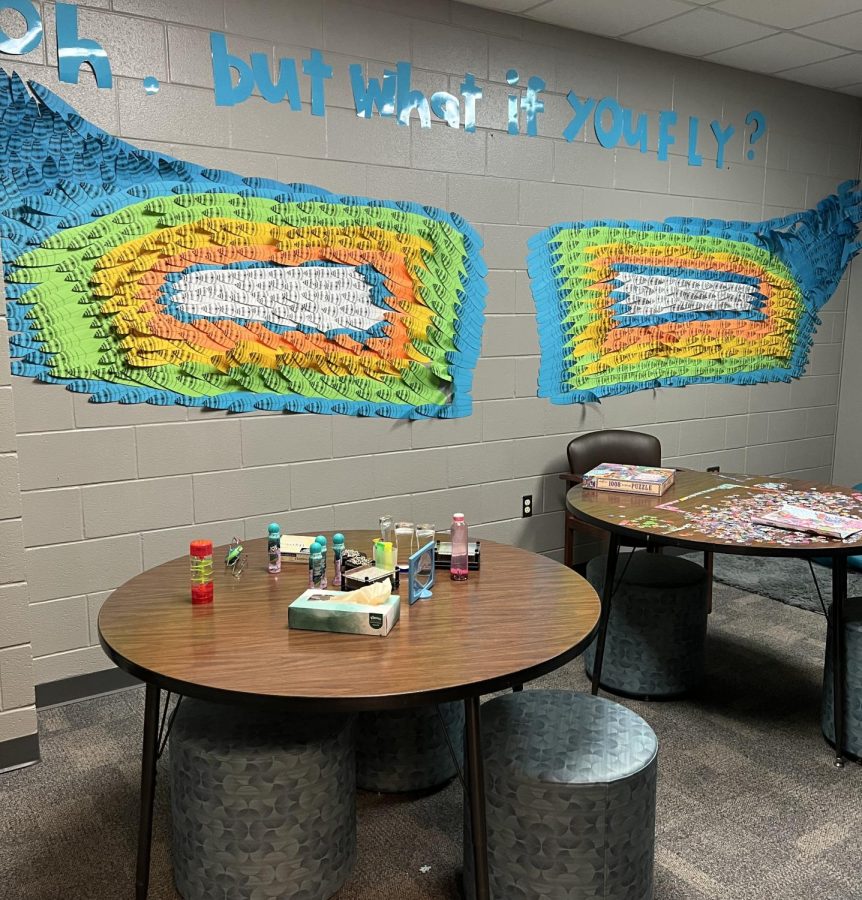Students VS The Internet
With students returning to in person classes, many have felt overwhelmed with their daily workloads.
Due to COVID-19, students in the last couple years have had an opportunity to go virtual rather than attend school in-person. With the option to do so, many students chose to go online, allowing them to stay home away from the concerns of the pandemic. These overall fears that lead to the virtual learning decisions, may have affected the students and their well-being.
With many students at Lake Ridge last year and the year before being completely virtual, there has been a change in how they are in terms of getting used to the in-person dynamic. One thing that has been noticed more frequently is how they have been affected mentally. AP Psychology teacher, Heather Willson, says that there have been studies conducted to prove peoples worries.
“Professionals are showing data that shows that mental health has declined, depression has increased and how other mental illnesses have seen a spike. This is seen in teens a lot more frequently especially since they’ve had to deal with the pandemic and had to limit their socializing,” stated Willson.
With students being online, they’re met with having to get used to their computer screens and don’t really have to interact with others unless they are forced to by the teacher. Now that the time period of having to be online is now over, the same students who were used to staring at their computer screens, now have to get used to coming to school everyday. AP U.S. history teacher, Leigh-Ann Smith, has noticed how students have changed a lot in terms of socializing.
“I have noticed a difference between the students who were virtual and those who weren’t. My juniors haven’t had a regular school year since eighth grade and there’s so much socialization and maturing that goes on around being with your peers. My juniors are not as social for the most part, I have some that are, but they’re not as willing to openly discuss topics and are definitely more closed off,” stated Smith.
The transition from in-person being optional to it being required has affected students who were former virtual students greatly. With the fact they had to get used to being in the classrooms, they also had to get used to being around their peers once again. Senior, Jomana Al-Aboudi, found it difficult to get used to being back in school.
“There were many changes to me mentally and physically when I switched from online to in person considering I was online for two years. Coming back to school was a bit weird for me because I was nervous to talk and sometimes the crowded hallways were so overwhelming, it was all different. I became very closed off because of being virtual,” stated Al-Aboudi.
Despite people choosing virtual, there are a few who preferred to be in person. The pros and cons that came out of the decision seemed to be at a balance for a lot of people. Tarek Hafza, sophomore, enjoys being in person despite dreading having to wake up early.
“I honestly prefer in person more than virtual now that I have gotten a chance to actually put myself out there more. Yeah being at home was nice, I didn’t have to wake up so early, but it affected my social skills. Now that we’re permanently in-person, I have to get used to coming out of my shell,” stated Hafza.
It is known that being online will limit social interaction. Willson believes that since students had the opportunity to go online, they were limited in their development. She acknowledges that despite it being for their safety, many strains are created due to having to spend so much time at home.
“The effects of someone going virtual, you’re going to have a decrease in socialization, a decrease in stimulation, social stimulation, and a decrease in communication. Depending on the child or learning modality in their personality, you’re going to see a shift in their educational abilities, because some kids have the maturity and the motivation to do it, and others do not. Another effect is you’re going to see a strain on the family dynamic. You’re going to probably also see a strain on the financial welfare of a family, especially on the younger children who are going virtual because parents can’t go to work unless they can work from home,” stated Willson.
The mental health of students has changed a lot since the beginning of the pandemic. Many students like Al-Aboudi have had to cope with things like anxiety especially since the switch. Many of them have had to take their time in growing back into social dynamics.
“Over the semester I’ve gotten better at controlling my anxiety and started talking with some old friends and made new friends as well. Pros for returning back to school is getting to experience high school and have my senior year experience, the cons was me having to confront my anxiety,” stated Al-Aboudi.
However, not only students were students affected by being virtual, but teachers were as well. Smith is someone who loves to be at school dearly and wants to be able to build relationships with their students. With many of her students being online, she didn’t really have much of an opportunity which affected her mentally.
“My online population was a lot larger than my in-person student population. I felt like my students who were virtual weren’t as engaged as the in-person students. It affected me mentally because I come to school everyday to see the kids, and since my entire A-days were virtual, I ended up dreading those days the most,” stated Smith.
Having to switch from staring at a screen to being in an interactive classroom has caused a lot of students to change. Not only do they have to worry about their mental health, but they have to also be concerned with their interactions with others.


